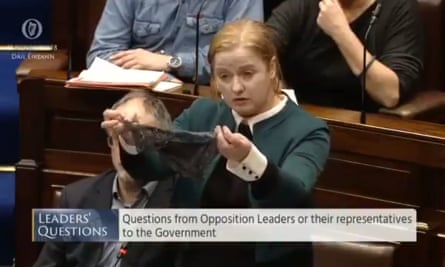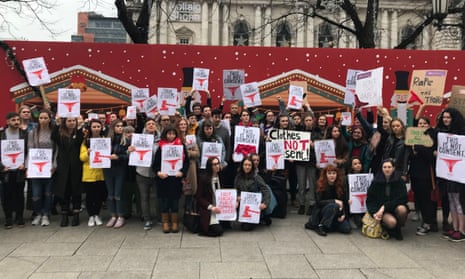It was a mere scrap of fabric, deep blue and edged with lace. But when the legislator Ruth Coppinger drew it from her sleeve and held it up in the Irish parliament this week, the item of women’s underwear caused consternation among her colleagues.
Elsewhere, women took to the streets carrying lingerie. In Cork, dozens of thongs were laid on the steps of the courthouse. In Belfast on Thursday, protesters tied knickers to placards and chanted: “My little black dress does not mean yes.”
Thousands of women posted pictures of their underwear on Twitter under the hashtags #IBelieveHer and #ThisIsNotConsent.
The trigger for protests across Ireland, and the eruption of fury on social media, was the words of a lawyer defending a man accused of rape in a trial in Cork.
Suggesting the complainant – 17-year-old woman – was “open to meeting someone”, Elizabeth O’Connell said: “You have to look at the way she was dressed. She was wearing a thong with a lace front.”
The defendant was acquitted in a unanimous verdict following deliberations by the jury lasting 90 minutes.
According to Fiona Ryan, a city councillor in Cork, anger over the defence counsel’s comments on 6 November took a few days to build.
“It didn’t blow up at first, it was almost a delayed reaction. But it festered,” she said. Ryan suggested staging a protest in Cork on Wednesday, eight days after the end of the trial, and was astonished when up to 500 people turned up to take part, many carrying items of underwear.

The day before, in the Dáil in Dublin, Coppinger had made her point with a flourish. “It might seem embarrassing to show a pair of thongs here ... how do you think a rape victim or a woman feels at the incongruous setting of her underwear being shown in a court?” she said.
At a rally in Dublin on Wednesday, Tara Brown of the National Women’s Council of Ireland said: “We stand in solidarity with survivors of sexual assault who are being grievously failed by our criminal justice system. The type of clothes a victim was wearing has no place in our criminal justice system, and it had no place in determining what is consent.
“We have a responsibility to create a safe system for survivors of sexual assault, and we are repeatedly shown that we are a long way from achieving a victim-centred [prosecution] system.”
In Belfast on Thursday, Cerys Falvey of the feminist campaign group Rosa said: “We have seen protests across Ireland saying this is no longer acceptable so what we need to do now is build a movement and fight back.”
According to Noeline Blackwell of the Dublin Rape Crisis Centre, juries in rape trials are often told details of what the victim has been wearing.
“It comes up very, very regularly how someone was dressed, the amount of drink they had taken, why they hadn’t screamed if they were in trouble,” she told the Irish Independent, after the verdict.
“These kind of mythologies and stereotypes around rape come up again and again in court cases, because the defence to rape is that the sex was consensual. So anything the defendant can do to suggest there was consent will be used,” she said.
Ryan said: “Unfortunately, the response, particularly from younger women, is that if this happened to them they wouldn’t report it.”
There was a lot of anger directed at the barrister, especially because she was a woman, she added. “But the reality is that is a cog in a dysfunctional wheel. This is standard practise in rape trials, and a reflection of the sexism and misogyny in our judiciary.”
This week’s protests echoed another in Belfast earlier this year when 1,000 people marched in solidarity with a 21-year-old woman at the centre of a rape trial that ended in the acquittal of two Irish rugby internationals. At the time there were also protests in Dublin, Derry, Cork, Limerick and Galway.
In court, a 19-year-old woman who had accused the pair of rape was cross-examined for eight days and her underwear was passed around for the jury to examine.
The case led to an independent review into how the criminal justice system in Northern Ireland deals with serious sexual offence cases.
